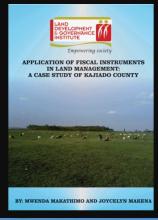/ library resources
Showing items 1 through 9 of 29.This report summarizes a case study of the Mexican ejidocommunity tenure system. Mexico was selected for this case study because of the rich history and extensive scale of the country’s community land tenure and registration systems.
This publication on Secure Land Rights for All demonstrates how secure land rights are particularly important in helping to reverse three types of phenomena: gender discrimination; social exclusion of vulnerable groups; and wider social and economic inequalities linked to inequitable and insecure
This thesis examines the extent to which Kenya’s domestic legal framework vindicates indigenous peoples’ land rights. The question of who is an indigenous person in Kenya is, of course, controversial.
Fiscal instruments are tools that governments use to manage revenue and expenditure and therefore influence the growth (or stability) of the various sectors of the economy. Government revenue is derived primarily through taxation.
The acquisition of land by foreigners in developing countries has emerged as a key mechanism for foreign direct investment (FDI).
Land plays a vital and central role in the economic, social-cultural and political lives of both individuals and communities.
Land acquisitions, either driven by foreign investments or domestic investment needs have continued to polarize opinions.
Kenya is going through a period of intense transition. The country's main development policy, Vision 2030, is just entering the second Medium Term Plan of Implementation from 2013.
Kenya is currently implementing a number of large scale infrastructure and development projects aimed at trans forming the country into a newly industrializing, middle-income country.
Pagination
Land Library Search
Through our robust search engine, you can search for any item of the over 73,000 highly curated resources in the Land Library.
If you would like to find an overview of what is possible, feel free to peruse the Search Guide.









